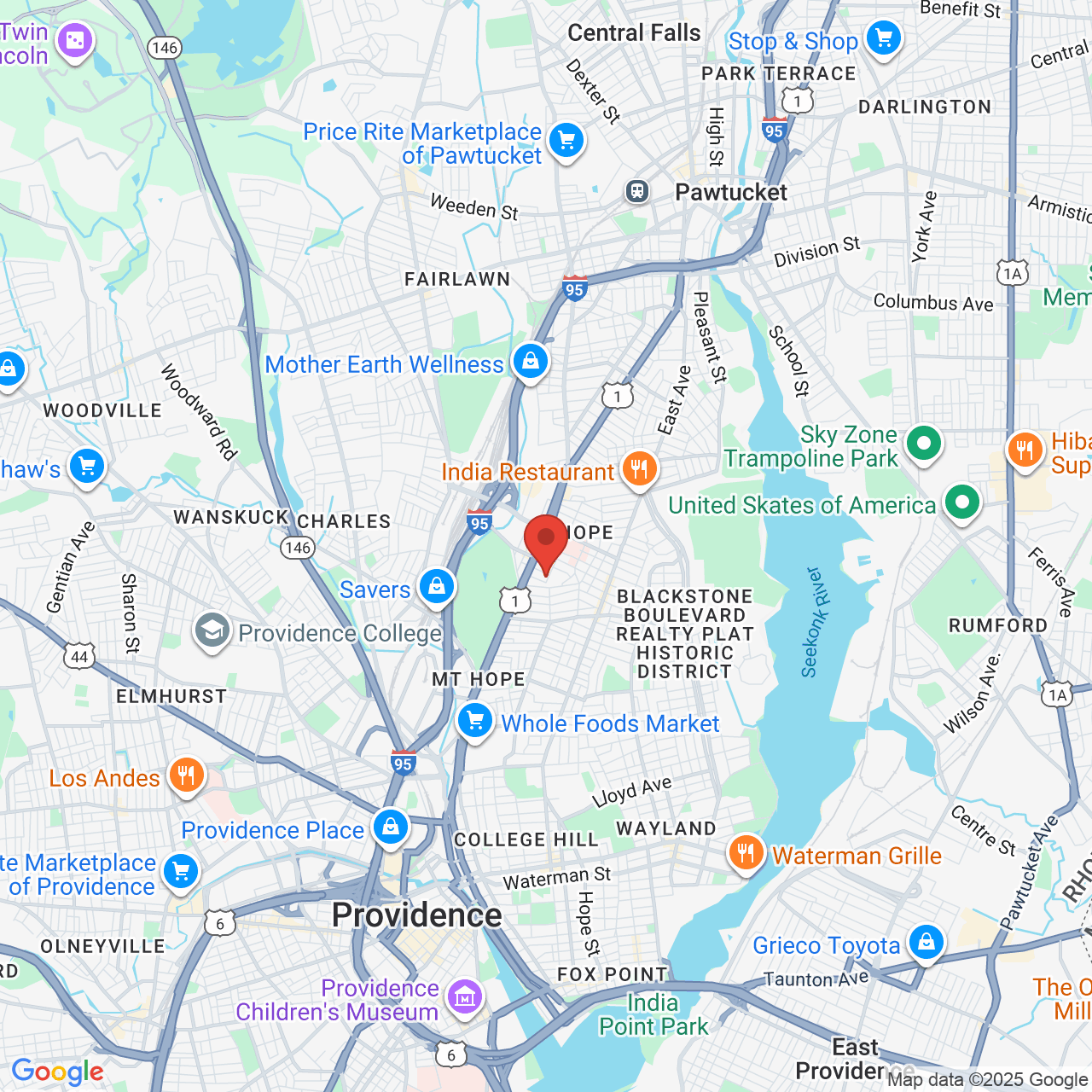Cataract Surgery Providence, RI
High-Tech Care for Clear Vision
- Femto laser-assisted and traditional cataract surgery
- Premium intraocular lens (IOL) options
- Board-certified ophthalmologist

At the Forefront of the Field
High-Tech Laser Surgery
In addition to traditional cataract surgery, Dr. Ezra L. Galler offers femto laser-assisted cataract surgery that makes bladeless incisions in the corneal tissue before softening the cataract. It can be performed in less time than the traditional approach, and can correct mild astigmatism during surgery. During a consultation at our Providence ophthalmology office, Dr. Galler can determine if traditional or laser cataract surgery is the best fit for your needs.
Advanced Lens Options
Our ophthalmologist in Providence, RI, offers a variety of intraocular lenses for different needs and preferences. You can choose from monofocal (vision correction for just one distance) or multifocal (vision correction for multiple distances). We have options that:
- Address astigmatism
- Address age-related vision loss
- Minimize dependency on glasses
It's Time to See the World With Clarity
If you've noticed changes in your vision, Dr. Galler is a board-certified ophthalmologist who can diagnose your condition and provide advanced treatment options. Dr. Galler specializes in cataract surgery and has become the eye surgeon of choice for many in Providence because he:
- Has practiced for more than 35 years
- Is a member of the American Society of Cataract and Refractive Surgery
- Uses the latest innovations in the field to provide advanced care
- Holds operating privileges at leading hospitals in and around Providence, RI
Protect the gift of sight and reach out to our Providence ophthalmology office today. We'll be happy to schedule you for an eye exam.

Dedicated to Affordable Care

Insurance
Cataract surgery and standard monofocal lenses are typically covered by insurance. We accept Medicare, Medicaid, and most private insurances. We can help you verify your coverage for cataract surgery and IOLs ahead of time and work directly with your insurance provider to help you make the most of your benefits.

Financing
If you're uninsured, have out-of-pocket expenses, or are receiving a premium lens that isn't covered by insurance, you can finance your treatment. Our Providence practice accepts financing through CareCredit® to help keep this life-changing treatment affordable. CareCredit allows qualifying patients to pay for their eye care in low-interest monthly installments.
A Patient Testimonial “My world has come alive.”
“Since my eye surgery, I can now truly see my world has come alive. I now see how beautiful my loving wife Andrea, my family, my friends and people all around me are. My daily life is now one of excitement. I now see the most vivid colors and brightness. Dr. Galler, your successful surgery on my eyes has changed my life.”

— Patient, VA Medical Center

Understanding Cataracts
A cataract is the clouding of the crystalline lens of the eye, typically caused by the natural aging process. It can also result from long-term exposure to UV rays, eye injuries, genetics, and complications from eye surgery. This cloudiness results from proteins within the eye clumping together. When the lens becomes cloudy, it reduces the amount of light reaching the retina.
Cataracts often develop slowly, gradually diminishing a person's vision quality. A person can have a cataract in one or both eyes.
During cataract surgery, an eye doctor carefully removes the clouded lens from the eye. The natural lens is then replaced with an artificial lens known as an intraocular lens (IOL). Once in place, the IOL will function like a healthy natural lens and allow your eyes to focus.
Cataract Symptoms
- Milky area in the pupil or iris
- Dim or blurry vision
- Double vision
- Increased light sensitivity
- Diminished night vision
- Halos around lights
- Fading color vision
- Colors appearing more yellow
- More light needed when reading
- Frequent eye prescription changes
Since cataracts often develop over time, symptoms could be difficult to notice. Regular eye exams are an essential preventative measure.
Experiencing Cataract Symptoms? Contact Us Today
According to the National Eye Institute, more than half of all Americans will have experienced cataracts or undergone cataract surgery by the age of 80.
Cataracts are common and treatable. If you’ve noticed changes in your vision or other symptoms of cataracts, or if you're overdue for an exam, schedule an appointment at Galler Eyecare Associates. During a comprehensive eye exam, Dr. Galler can identify cataracts or other issues and determine the best treatment for you.

A Thorough Diagnosis
During an eye exam, Dr. Galler will test your vision and the structures of your eyes. This may include a traditional visual acuity test, a slit-lap examination, and a retinal exam.
Dr. Galler will also speak with you about your symptoms and cataract risk factors. He'll want to know how cataracts have affected your quality of life.
Developing a Treatment Plan
Following your comprehensive eye exam, Dr. Galler will review your treatment options. If surgery isn't required yet, he can go over preventative care, lifestyle changes, and other strategies to mitigate vision loss.
If you require cataract surgery, Dr. Galler can review the procedure in detail, answering any questions you may have.
Is It Time for an Exam?
Starting at age 40, you should undergo a comprehensive eye exam every two to four years to detect any signs of cataracts or other ocular health issues in the earliest stages.
Laser-Assisted Surgery With Options for Combined Procedures

Galler Eyecare Associates proudly offers femtosecond laser–assisted cataract surgery, a bladeless approach known for its precision. The femtosecond laser uses advanced imaging, creates ultra-accurate corneal incisions, and softens the cataract before removal. This technique allows for:
- Greater accuracy in lens placement
- Reduced surgical time and quicker recovery
- Built-in astigmatism correction during the same procedure
Femtosecond laser surgery is a flexible procedure that can be combined with other treatments. For example, if you have cataracts and glaucoma, you could benefit from a procedure that addresses both eye conditions in a single session, reducing your overall healing time and eliminating the need for multiple surgeries.
Dr. Galler’s extensive experience with both blade and laser technologies means you’ll receive the approach best suited to your eyes and medical needs. Explore all of your options at our Providence practice today.
The Cataract Surgery Procedure
We perform cataract surgery at an off-site medical facility. Your procedure will involve these general steps:
The cataract removal procedure takes around 20-30 minutes to complete.
A High Success Rate
Nearly 4 million Americans undergo cataract surgery each year. Studies show approximately 95% of patients enjoy improved vision, and serious complications are rare.
Explore Your IOL Choices Advanced Options to Restore Clear Vision
Cataract surgery can restore clarity and sharpen your focus at multiple distances. Dr. Ezra Galler will guide you through several advanced IOL options during your consultation so that you can select the lens that best matches your lifestyle and visual goals. Our Providence office has choices such as:
Monofocal Lenses: These lenses provide crisp vision at a single distance, usually distance vision. Users often still need glasses for up-close tasks like reading.
Toric Lenses: These lenses correct astigmatism while delivering the benefits of a monofocal lens. They can help reduce your dependence on glasses for distance vision.
Multifocal or Extended-Depth Lenses: These options offer clear vision at near, intermediate, and far ranges. They’re ideal for patients who want to minimize or even eliminate their need for glasses altogether.
Lifestyle Lenses: These lenses are designed to balance distance, intermediate, and near vision for patients who spend time on computers, enjoy night driving, or simply want more freedom from glasses.
Dr. Galler will consider unique needs like your driving habits, reading preferences, and daily activities before recommending an IOL that supports your long-term eye health and comfort.

Life After Cataract Surgery

- Most patients notice improved clarity within a day or two after cataract surgery, but full visual stabilization can take a few weeks.
- Follow your post-op instructions carefully and attend all scheduled follow-up appointments so Dr. Galler can monitor your healing.
- Blurry vision and dryness are fairly common side effects, but they typically resolve after a few weeks. Eye drops can help alleviate the conditions.
- Maintain your long-term eye health with annual eye exams and UV protection. Both will help preserve your results for years to come.
FAQ About Cataract Surgery in Providence, RI
Do I need to get my cataracts removed?
Not until they reach an advanced stage. Cataract surgery is recommended when the clouded lens severely impacts your eyesight, your ability to complete everyday tasks, and your overall quality of life. If your cataracts do not require surgery at the moment, you may be asked to wear sunglasses with 100% UV protection and polarized lenses to slow down the progression of your condition. We can also recommend assistive devices for daily activities. Attend regular eye exams to monitor the development of your cataracts.
Do I really need IOLs after my cataracts are removed?
Yes. With your natural lenses no longer in place, your eyes won't be able to focus, and everything will appear blurry. Your IOL will take over the function of your natural lens to work in tandem with your retina and cornea to provide sharp vision.
I have cataracts and glaucoma. What are my options?
Patients who have both cataracts and glaucoma are in good hands at Galler Eyecare Associates. Dr. Galler has decades of experience diagnosing and helping patients manage both conditions. He offers minimally invasive treatments for glaucoma that can be performed in a combined procedure with cataract surgery.
Have Another Question?
Another Satisfied Patient “The team is wonderful.”
“I have been going to Dr. Galler for 20 years. The team is wonderful. I’ve had lasik surgery and cataracts removed. Nothing but great things to say.”

-Pamela, Providence Cataract Surgery Patient


